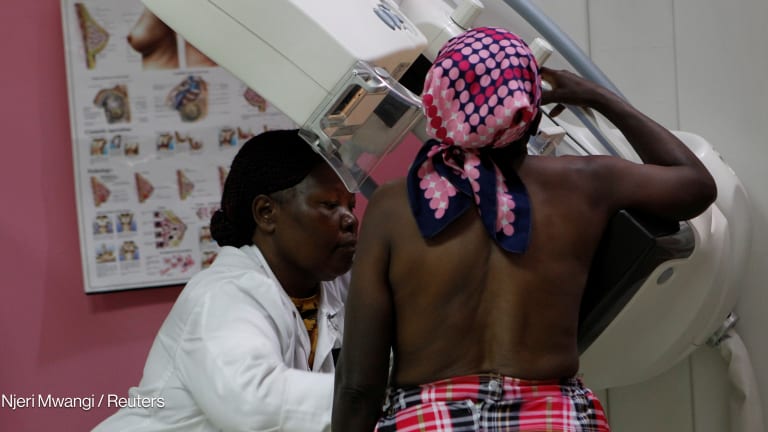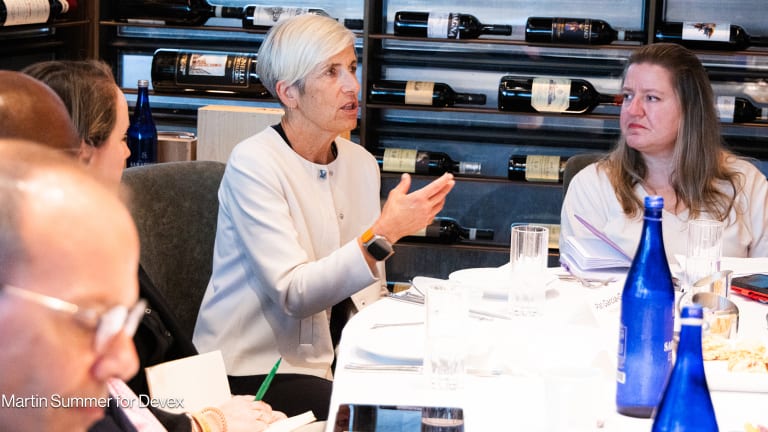Career advice from a global health consultant
Diogo de Sousa Neves, a consultant at the World Health Organization, discusses the skills needed to help advance equitable access to high-quality health care services.
As a global health professional, Diogo de Sousa Neves is dedicated to improving equitable access to health services by supporting the coordination and building of effective health policy mechanisms with multilateral and nongovernmental organizations. For the past few years, Neves acted as an independent consultant with organizations such as the World Health Organization and the Union for International Cancer Control focusing on private-sector engagement and cross-sectoral partnerships to advance health sector responses to complex diseases such as cancer and other noncommunicable diseases. His responsibilities include stakeholder engagement, data analysis, and translating data into information that can be accessible to a wide range of audiences. Neves’ career was initially geared toward research on pharmaceuticals, not development or global health. Over a 12-year course, he has gained experience with global cancer control initiatives, including as a program officer at the International Atomic Energy Agency and as a senior manager of technical assistance and partnerships at the City Cancer Challenge Foundation. Consultancy is highly sought after, often requiring extensive experience and expertise in specialized areas. Speaking to Devex, Neves highlighted the importance of effective collaboration within multidisciplinary teams, as well as a good deal of patience and persistence to make an impact in this field. This conversation has been edited for length and clarity. How did you end up in this type of work? Initially, my career and interests leaned toward advanced drug delivery systems with the use of nanotechnology. This was after completing my studies in pharmaceutical sciences. I was really passionate about research. However, by chance, I met a person deeply involved in development work at the United Nations, which altered my course entirely. She introduced me to what was then a relatively new program focused on access to cancer treatment, igniting in me a profound interest in the scope and ambitions of such initiatives. I was very intrigued by the prospect of working within organizations different from my previous experiences, so I applied for an internship at the International Atomic Energy Agency. There, I was introduced to an entirely new world of health diplomacy and technical cooperation with governments. This experience sparked my increasing interest in learning from experts in cancer control as well as professionals in political science and business analytics. I realized that my health background, problem-solving-oriented mentality, and my curious nature were quite helpful in facilitating dialogues among teams and partner organizations to push initiatives forward. Fast-forward 12 years; I feel privileged to have supported many successful initiatives to scale up their reach and impact. I am also immensely grateful to still be involved in advancing access to cancer care worldwide through country-led initiatives. What does your day to day look like? My work involves facilitating technical cooperation to improve access to health services through adequate health policy mechanisms. This means that a great deal of my tasks are related to ensuring that all necessary individuals and institutions key to the project’s success remain motivated and engaged. Health policy development is complex, and projects in this field are inherently multidisciplinary and involve partners with both global and local presence. A significant portion of my efforts is dedicated to ensuring all stakeholders are properly aligned and have visibility on the overall aims and implementation strategies so that they can find suitable entry points to contribute efficiently and effectively, minimizing transactional costs for organizations and public agencies. In practice, this translates to analyzing data, writing reports and briefs, and organizing and attending meetings with partners, experts, and health officials. A considerable amount of my time is also dedicated to compiling and analyzing health systems data, translating it into understandable information, and creating resources to support in assessing and prioritizing technical assistance efforts. What do you see as some of the main priorities for advancing equitable access to high-quality health care services globally? Access to health care services remains significantly unequal between high-income and low- and middle-income countries, or LMICs. Political stability, local leadership, and economic growth play pivotal roles in fostering an environment supportive of greater domestic investments in health care infrastructure and workforce — and these factors influence more than just the health sector. In contexts where health budgets remain very limited and constrained to donor priorities like in many LMICs, it’s important to be pragmatic and optimize in-country resources within the health sector. This involves establishing and reinforcing health service networks through collaboration across sectors and, when possible, among countries. Collaborating within these local, regional, or global networks enables more efficient resource allocation and management, greater knowledge sharing, and the development and adherence to quality standards, thereby enhancing patient care. Health service delivery depends not only on adequate policies, human resources, and infrastructure but also on technology developed by the private sector. Therefore, achieving global health care equity requires ensuring the availability and affordability of essential medicines and health technologies worldwide. This involves establishing sustainable supply chains, implementing equitable pricing models, and promoting manufacturing capacity in LMICs through collaboration between governments and corporations. What skill sets have you found to be most valuable, or what skills have you focused on building to progress in your career? My background as a health professional — specifically as a trained pharmacist with specializations in health economics, policy, and law — has provided me with the ability to collaborate effectively within multidisciplinary teams, a vital aspect of this field. I consider my analytical skills in health policy to be among my most valuable assets. They have proven instrumental in navigating complex policy processes and conveying messages concisely to diverse stakeholders. Additionally, I continuously strive to improve my communication and negotiation skills, recognizing their importance in overseeing projects where different interests and expectations need to be adequately managed. Can you tell us about your work translating data and the importance of this in the context of global health and policy? In the realm of global health, data serves as the backbone for informed decision-making and policy development. However, simply collecting vast amounts of data without clear objectives can lead to unnecessary complexity, waste of resources, and diversion from core objectives. Likewise, without translating raw data into meaningful insights, it cannot effectively contribute to coherent storytelling or the formulation of better policies. In my approach to conducting health system assessments, I prioritize streamlining data collection processes and take the time to identify which data points are truly essential for the intended purpose. This ensures that the data collected is not only relevant but also actionable, enabling more focused and impactful decision-making in global health initiatives. What advice would you have for other professionals looking to work in this type of role? I believe that professionals working in this space require a balanced blend of patience and persistence because the impact of our actions isn’t always immediately visible or easily measured through standard KPIs. While there’s a pressing global need for action, it’s crucial to remain humble about our contributions. True impact in global health initiatives often relies on alignment and complementarity with other efforts, rather than acting in isolation. I also think that for professionals like myself who didn’t originally pursue academic studies or careers aimed at working in the development space but are interested in international cooperation, it’s important to consider how your experiences and skills can be transferred and utilized as differentiators in global health initiatives. Ready to stand out from the crowd and get noticed by the recruiters who matter most? Update your Devex profile and start connecting with top global development recruiters now.
As a global health professional, Diogo de Sousa Neves is dedicated to improving equitable access to health services by supporting the coordination and building of effective health policy mechanisms with multilateral and nongovernmental organizations.
For the past few years, Neves acted as an independent consultant with organizations such as the World Health Organization and the Union for International Cancer Control focusing on private-sector engagement and cross-sectoral partnerships to advance health sector responses to complex diseases such as cancer and other noncommunicable diseases. His responsibilities include stakeholder engagement, data analysis, and translating data into information that can be accessible to a wide range of audiences.
Neves’ career was initially geared toward research on pharmaceuticals, not development or global health. Over a 12-year course, he has gained experience with global cancer control initiatives, including as a program officer at the International Atomic Energy Agency and as a senior manager of technical assistance and partnerships at the City Cancer Challenge Foundation.
This article is exclusively for Career Account members.
Unlock this article now with a 15-day free trial of a Devex Career Account. With a Career Account subscription you will get:
- Full access to our jobs board, including over 1,000 exclusive jobs
- Your Devex profile highlighted in recruiter search results
- Connections to recruiters and industry experts through online and live Devex events
Start my 15-day free trialAlready a user?
Printing articles to share with others is a breach of our terms and conditions and copyright policy. Please use the sharing options on the left side of the article. Devex Pro members may share up to 10 articles per month using the Pro share tool ( ).
Katrina Lane is an Editorial Strategist and Reporter at Devex. She writes on ecologies and social inclusion, and also supports the creation of partnership content at Devex. She holds a degree in Psychology from Warwick University, offering a unique perspective on the cognitive frameworks and social factors that influence responses to global issues.








